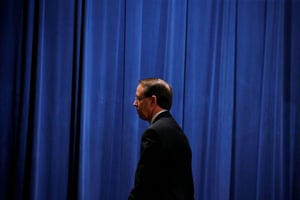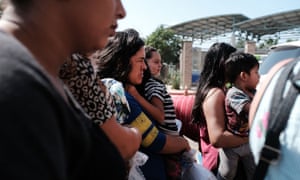
Rod Rosenstein, the former deputy attorney general, advised US attorneys implementing the 2018 zero-tolerance policy that there could be no blanket ban on prosecuting migrant parents who had children under the age of five, the Guardian has learned.
The comments on a conference call in May 2018 privately shocked some border state prosecutors because, in effect, it meant that no child was too young to be separated from its parents under the policy, which called for all migrants entering the US illegally to face criminal prosecution.
The family separations that followed are seen today by experts as one of the gravest domestic human rights violations to have occurred under the Trump administration.
The policy was in place for six weeks and resulted in the separation of 2,814 children from their parents and guardians, about 105 of whom were under the age of five and 1,033 under 10.
Rosenstein issued his guidance to US attorneys from states on the Mexican border about two weeks after the then attorney general, Jeff Sessions, issued an order that there would be an “escalated effort” to prosecute all illegal entries into the US along the southern border, according to sources familiar with the matter who spoke to the Guardian under the condition of anonymity.
Previously, under the Obama administration, most families who crossed the border illegally were detained together if they were arrested or were released pending an immigration trial, but were only separated if authorities deemed children to be in danger.
There were questions among the border state US attorneys at that time about how the zero-tolerance policy would be implemented and the conference call with Rosenstein sought to address those issues.
On the call, one US attorney, John Bash of the western district of Texas, said he had declined to prosecute several cases that had been referred to him by Customs and Border Protection (CBP) that involved children under the age of five.
In response, sources familiar with the matter said Rosenstein told the US attorneys that they could not decline to prosecute cases based on the age of the children who would be separated from their parents because there was “no categorical exemption” under the order.
During the call, Rosenstein was also asked whether prosecutors could decline to prosecute parents with children who only spoke indigenous languages, meaning they were unable to communicate in English or Spanish, or those whose children had intellectual disabilities. Rosenstein said that prosecutors could opt to decline to prosecute individuals with children under those two circumstances on a case-by-case basis, sources said.
The comments were met with shock by some of the US attorneys, sources said, because there was concern that children who were under the age of five would not know their own names or their parents’ names and that it posed a risk of children potentially getting lost in the system.

Lee Gelernt, a senior immigration lawyer, with the American Civil Liberties Union (ACLU), said: “Everyone, but especially the DoJ, should have known that tearing children away from their parents was patently unconstitutional. The ACLU should never have had to file a lawsuit to establish that obvious point.”
Rosenstein, who retired from the Department of Justice (DoJ) in 2019 and is now a partner at King & Spalding, a top Washington law firm, said in a statement to the Guardian: “Federal prosecutors did not separate parents from children. The policy the attorney general adopted for the Department of Justice in April 2018 was unambiguous: every defendant the Department of Homeland Security [DHS] arrested and referred for prosecution would be evaluated by federal prosecutors without any categorical exemption.”
Under the zero-tolerance policy, hundreds of parents were deported to their home countries without their children and the family separations were later deemed by a federal judge in California to be unconstitutional, “brutal” and “offensive”. The government’s conduct, Judge Dana Sabraw said, arbitrarily tore at the “sacred bond between parent and child”.
The policy was in place from 6 April 2018 to 20 June 2018 when, facing intense legal and congressional pressure, it was ended by an executive order by Donald Trump.
One former DoJ official defended the department’s actions and told the Guardian that the attorney general’s order had “no effect” unless the DHS referred cases, which the person claimed was solely under the DHS’s purview.
“DHS repeatedly complained to the White House that DoJ was not prosecuting enough cases. They were driving the train,” the former official said.
Kirstjen Nielsen, who served as DHS secretary at the time, has defended her actions in that period, saying she was “enforcing the law”.
An investigation by the internal watchdog at the Department of Homeland Security found that CBP, a division of the DHS that enforces border controls, relied on “ad hoc” measures to record and track family separations and that it knew as early as November 2017 that its systems were deficient.
The DoJ has so far received far less scrutiny for its involvement in the child separation policy than the Department of Homeland Security or the Department of Health and Human Services, which had custody of the children once they were separated.
The DoJ has consistently denied that it ever had a policy to separate children from their parents. But the new information suggests that the DoJ’s knowing cooperation facilitated the execution of the zero-tolerance policy and that it was fully aware that the immigration policy would result in children being separated from their parents, including those under the age of five.
Other participants on the conference call included Iris Lan, an associate deputy attorney general who has been nominated by the Trump administrationto fill a lifetime appointment as a judge for the southern district of New York, and Adam Braverman, who was serving as an acting US attorney in the southern district of California at the time and has been nominated to serve as a judge in that district. Their nominations have not yet been reviewed or approved by the Senate.
Details about Rosenstein’s call with US attorneys have been shared with the inspector general’s office of the DoJ, which is conducting a review of the “planning and implementation” of the zero-tolerance policy by the department.
A spokesperson for the DoJ said US attorneys had “maintained discretion to make prosecutorial decisions on a case-by-case basis”. It declined to comment on “internal deliberations” but, in response to questions sent to Lan by the Guardian, said that Lan would “have had no policy decision-making role”. The Guardian also requested a comment from Braverman but did not immediately receive a response.
A spokesperson for the US attorney’s office in the western district of Texas declined to comment.
Rosenstein is not believed to have been a driving force behind the zero-tolerance policy, which was launched by Sessions in conjunction with the White House as part of Trump’s campaign to crack down on undocumented migrants.
He gained an unusually high profile in his role as the No 2 official at the DoJbecause he had oversight of Robert Mueller’s investigation into Russian interference in the 2016 election.
For many Democrats, Rosenstein’s longtime career at the DoJ and his institutional role was seen at the time as an assurance that the investigation would be protected from possible interference by the Trump administration. His role in the zero-tolerance policy has received far less scrutiny.
Rosenstein publicly defended the zero-tolerance policy at an American Bar Association conference in August 2018, where he said he believed it was consistent with the rule of law and reflected a surge in illegal immigration into the US.
“It would be wrong to say we’re prosecuting everyone without regard to the law,” he said, adding that the DoJ was committing resources to ensure that everyone was treated equally under the law rather than “picking and choosing” who will be prosecuted.
Agencies in the federal government including the DoJ had already experimented with a “pilot programme” of child separation in the western district of Texas in 2017, which resulted in the separation of 1,556 children from their parents. Court-ordered efforts to reunite parents with their children in hundreds of those cases have largely “come to a halt” in Latin America during the coronavirus crisis, according to immigration lawyers at the ACLU, which has helped lead the effort."
Revealed: Rod Rosenstein advised there was no age limit on child separations | US news | The Guardian
No comments:
Post a Comment